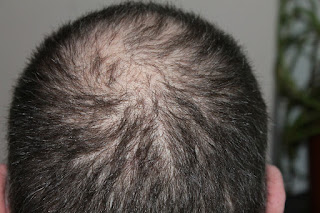Causes of Hair Loss - Illnesses that cause hair loss
Hair loss can have many causes
It is never pleasant to lose one's hair excessively. There can be various causes of hair loss, so there is unfortunately no miracle recipe valid for all cases. That's why it's important - preferably with the help of the doctor - to determine the exact causes of hair loss. Most of the time, one of the following factors will be responsible for hair loss.
Most of the time, it's the genes that are responsible
According to experts, hair loss has in most cases a genetic cause. It is then qualified as androgenic hair loss, alopecia androgenetica or androgenetic alopecia. On closer inspection, it is more precisely the combination of the two following factors: firstly, hereditary hypersensitivity to certain sex hormones, and then also a minimal concentration of these so-called androgens in the scalp.
Because of this genetic predisposition, testosterone - the male sex hormone - is transformed into dihydrotestosterone (DHT). DHT is responsible for the fact that the growth phase of the hair is shortened, and that the regrowth of the hair is rather thin. Androgenic alopecia is characterized in men by cleared frontal glands, which will gradually widen until the front is completely bald.
When the immune system goes wrong
The so-called circular hair loss, also called alopecia aerata or alopecia circumscripta, is generally less well known. However, in France alone, more than one million people suffer from this inflammatory disease, which causes hair loss.
The persons concerned recognize the glabrous circular zones that form mainly on the head. The experts are almost unanimous in thinking that a dysfunction of the immune system is at the origin of this affection. He mistakenly attacks his own hair, causing their rejection.
Even the hair is under stress
Excessive stress can not only lead to illness, but also to hair loss. The truth part of this assertion is still partly disputed with regard to alopecia aerata, although some studies reveal a relationship between circular hair loss and stress.
On the other hand, it is widely accepted as certain that diffuse hair loss (telogen effluvium) can be caused and intensified by significant stress.
Hair falls in case of nutrient deficiencies
In nature, nutrients condition growth in virtually all areas. Hair is no exception to the rule. They need not only vitamins - mainly those in group B - but also trace elements and amino acids. These amino acids are arginine, glutamine or cysteine. When some of these nutrients are not available or at least not in sufficient quantity, this can lead to hair loss.
A typical case is, for example, heavy hair fall linked to a biotin deficiency - also known as vitamin B7 or vitamin H - or a deficiency of zinc - which is a trace element. The causes are generally related to diets, but also to a diet that is too one-sided.
Hair loss, a symptom of illness
Sudden hair loss can also be a sign of illness. There are so many illnesses that cause hair loss that it is difficult to make an exhaustive list. Sudden hair loss can occur abruptly in case of infection (alopecia parvimaculata or alopecia symptomatica).
Examples include boils, shingles and erysipelas. Or also mucinosis (alopecia muciosa), syphilis (alopecia specifia), metabolic diseases or thyroid dysfunction. Precisely because sudden extreme hair loss can be a sign of serious illness, it is always advisable to see a doctor as soon as possible.




Comments
Post a Comment